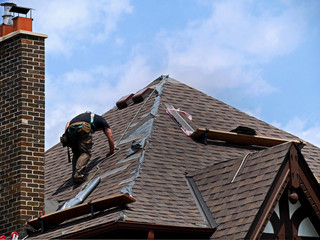Roofers are a profession in construction, and they are responsible for repairing and constructing roofs. They use a variety of materials to achieve their goals. Here are a few common types of jobs performed by roofers. These tradespeople can also be called roof mechanics or roofing contractors. These professionals work on commercial and residential buildings and use various tools and materials to build or repair roofs.

Roofers Morris County NJ is responsible for repairing, installing, and replacing roofs for buildings. Roofing is a trade that requires little formal education, and most workers learn on the job. However, some enter this occupation through apprenticeships. Some work overtime, especially during the summer when demand for their services is excellent.
Roofing materials are the first line of defense against water, wind, and ice. These materials support the roof’s other layers and are protected by various materials, including rubber boots, metal flashing, and sealants. The materials also protect the roof from deterioration by shedding moisture.
Although wood shingles do not have the same fire resistance as asphalt, they can be beautiful and have a long lifespan. Slate roofing, for example, is durable and can last 50 to 200 years. It can also be coated with a fire-resistance coating for added protection. Slate roofing is relatively affordable, ranging from $9 to $20 per square foot.
Roofing materials are an important consideration in a homeowner’s decision. They protect the interior of a home, and they need to be durable and provide the best value for their money. There are many different roofing materials, from slate to solar, and each has advantages and disadvantages. You should carefully consider the size and style of your home and your budget before making a final decision.
Roofing professionals must have the right tools to complete any job. These tools can be dangerous and require proper training. In addition to using the correct tools, roofers must wear appropriate safety gear. Roofing hammers and hatchets are the most common tools used by roofers. However, most roofers nowadays prefer nail guns to install new roofing materials. While these tools are faster, they have more safety risks.
To safely complete a roofing project, a roofer needs a ladder to reach the roof, steel-toed shoes, and a hard hat. Other essential tools include a pop-river gun and a caulking gun. Scissors are also helpful in cutting and removing loose materials. Hammers and mallets, utility knives, and hacksaws are also useful tools. Pitchforks and spades are also common tools used by roofers. They are used to fasten shingles onto buildings.
Hours of work for roofers vary by region. In some regions, they work from dawn until dusk. Many cities restrict work beyond these hours. Hours for residential roofers are usually from 7 am to 7 pm. However, the foreperson may keep workers on the job for longer. Roofing is a physical job that requires long hours on a ladder. This occupation requires a lot of physical strength and a thorough knowledge of different roofing materials.
Roofing workers must abide by safety rules when they work on rooftops. A roof is not made for foot traffic, so tripping and falling from the roof can lead to serious injury. In addition to common sense, workers must wear proper PPE while working on the roof. Proper PPE can help prevent slips and falls and keep the roofer and the building’s inhabitants safe from harm.
In addition to fall protection, roofers should consider safety measures when working on the roof, including edge protection. Edge protection can come from scaffolding or an elevating work platform. Other measures include safety mesh, safety nets, and fall arrest systems.
Roofing tradespeople specialize in a wide range of roof construction activities. They repair, replace, and install roofs, and they can use a variety of materials. Sometimes, they are also known as roof mechanics or roofing contractors. Training for roofers can be obtained online, in an apprenticeship, or through on-the-job training.
Training for roofers includes various topics, from roofing products and procedures to warranties and durability. Training courses are geared towards roof installation and maintenance and will give students a foundation in the most current methods and materials. The training course will also give students an understanding of the different techniques and rules for the optimization of roofs.
Training for roofers can help a roofer gain valuable industry certifications. Certification programs typically involve four years of on-the-job and technical training, including tests and exams. This certification may be mandatory or voluntary in some provinces, but it is often recommended and gives the worker a competitive edge in the field.